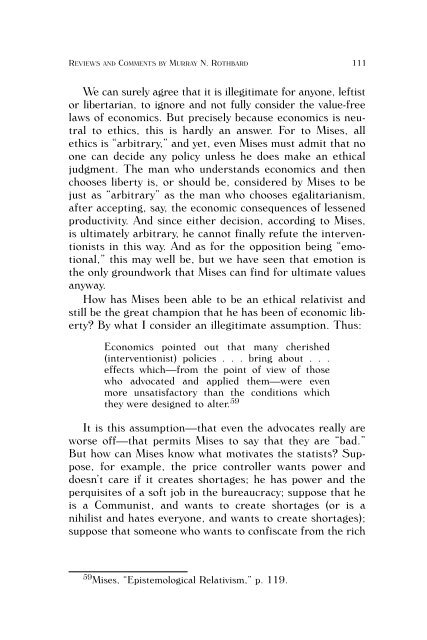Murray N. Rothbard vs. the Philosophers - Ludwig von Mises Institute
Murray N. Rothbard vs. the Philosophers - Ludwig von Mises Institute
Murray N. Rothbard vs. the Philosophers - Ludwig von Mises Institute
You also want an ePaper? Increase the reach of your titles
YUMPU automatically turns print PDFs into web optimized ePapers that Google loves.
REVIEWS AND COMMENTS BY MURRAY N. ROTHBARD 111<br />
We can surely agree that it is illegitimate for anyone, leftist<br />
or libertarian, to ignore and not fully consider <strong>the</strong> value-free<br />
laws of economics. But precisely because economics is neutral<br />
to ethics, this is hardly an answer. For to <strong>Mises</strong>, all<br />
ethics is “arbitrary,” and yet, even <strong>Mises</strong> must admit that no<br />
one can decide any policy unless he does make an ethical<br />
judgment. The man who understands economics and <strong>the</strong>n<br />
chooses liberty is, or should be, considered by <strong>Mises</strong> to be<br />
just as “arbitrary” as <strong>the</strong> man who chooses egalitarianism,<br />
after accepting, say, <strong>the</strong> economic consequences of lessened<br />
productivity. And since ei<strong>the</strong>r decision, according to <strong>Mises</strong>,<br />
is ultimately arbitrary, he cannot finally refute <strong>the</strong> interventionists<br />
in this way. And as for <strong>the</strong> opposition being “emotional,”<br />
this may well be, but we have seen that emotion is<br />
<strong>the</strong> only groundwork that <strong>Mises</strong> can find for ultimate values<br />
anyway.<br />
How has <strong>Mises</strong> been able to be an ethical relativist and<br />
still be <strong>the</strong> great champion that he has been of economic liberty?<br />
By what I consider an illegitimate assumption. Thus:<br />
Economics pointed out that many cherished<br />
(interventionist) policies . . . bring about . . .<br />
effects which—from <strong>the</strong> point of view of those<br />
who advocated and applied <strong>the</strong>m—were even<br />
more unsatisfactory than <strong>the</strong> conditions which<br />
<strong>the</strong>y were designed to alter. 59<br />
It is this assumption—that even <strong>the</strong> advocates really are<br />
worse off—that permits <strong>Mises</strong> to say that <strong>the</strong>y are “bad.”<br />
But how can <strong>Mises</strong> know what motivates <strong>the</strong> statists? Suppose,<br />
for example, <strong>the</strong> price controller wants power and<br />
doesn’t care if it creates shortages; he has power and <strong>the</strong><br />
perquisites of a soft job in <strong>the</strong> bureaucracy; suppose that he<br />
is a Communist, and wants to create shortages (or is a<br />
nihilist and hates everyone, and wants to create shortages);<br />
suppose that someone who wants to confiscate from <strong>the</strong> rich<br />
59 <strong>Mises</strong>, “Epistemological Relativism,” p. 119.


